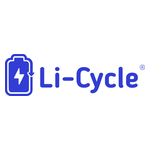
Li-Cycle Opens Lithium-Ion Battery Recycling Facility in Arizona
Li-Cycle’s third operational Spoke facility in North America commences operations, with capacity to process up to 10,000 tonnes of manufacturing scrap and end-of-life batteries per year
Arizona Spoke is the first to utilize Li-Cycle’s proprietary technology to directly process full EV battery packs
Facility can process equivalent of batteries required for approximately 20,000 EVs per annum
TORONTO–(BUSINESS WIRE)–Li-Cycle Corp. (NYSE: LICY) (“Li-Cycle” or the “Company”), an industry leader in lithium-ion battery resource recovery and the leading lithium-ion battery recycler in North America, today announced that its previously announced Arizona Spoke facility located in Gilbert, Arizona has commenced commercial operations.
Arizona presents a significant opportunity for lithium-ion battery recycling due to the emerging electric vehicle (EV) supply chain in the region, as well as its close proximity to large markets such as California, which are expected to produce an increasing supply of end-of-life batteries available for recycling from EVs, energy storage projects and consumer electronics.
Li-Cycle’s Arizona Spoke facility is the first-of-its-kind, utilizing proprietary technology that processes full EV battery packs without dismantling them manually, making recycling of those battery packs safer, sustainable and more labor efficient. The facility is strategically located close to the Company’s existing battery and manufacturing scrap supply network in the Southwestern United States, which optimizes logistics and other efficiencies for recycling services.
“The launch of Li-Cycle’s innovative battery recycling facility bolsters Arizona’s already robust EV supply chain and sends a signal that Arizona is the place to be for electric batteries,” said Arizona Governor Doug Ducey. “Sustainable industries have found a home in Arizona, and few companies represent the innovation and possibilities that brings like Li-Cycle. We are proud to see Li-Cycle’s facility up and operational.”
“We are excited Li-Cycle’s innovative battery recycling facility has commenced operations,” said Sandra Watson, President and CEO of the Arizona Commerce Authority. “Li-Cycle’s Arizona Spoke will increase EV battery recycling capabilities, strengthening Arizona’s battery and electric vehicle supply chains while creating quality jobs in the community.”
“We are pleased to announce that our Arizona Spoke is operational,” said Richard Storrie, Regional President, Americas of Li-Cycle. “This new state-of-the-art facility enhances our ability to serve the recycling needs of our customers, while significantly increasing our operational recycling capacity. We’re also creating an additional domestic source of critical metals to be transformed and supply lithium-ion battery production.”
Li-Cycle held a Grand Opening Event earlier in May 2022 at the 140,000-square-foot facility as it made its official debut. At the event, Li-Cycle was joined by its customers, local government officials, and others connected to the Gilbert community and surrounding area in celebration of a momentous occasion for Li-Cycle and the region’s lithium-ion battery supply chain.
Li-Cycle’s Alabama Spoke, which is of the same design as the Arizona Spoke, is scheduled to be operational in the Company’s third quarter of 2022. When both the Arizona and Alabama Spokes are operational, Li-Cycle will have a total processing capacity of 30,000 tonnes per annum. By the end of 2023, the Company expects to have a total of 65,000 tonnes of lithium-ion battery processing capacity per annum, across its Spokes in North America and Europe.
The primary output product of the Arizona Spoke is black mass, consisting of a number of highly valuable critical metals, including lithium, cobalt and nickel, which Li-Cycle will convert into battery-grade materials at its first North American Hub facility, which is under construction in Rochester, New York. Li-Cycle expects that the Hub will be capable of processing 35,000 tonnes of black mass annually, with targeted commissioning in 2023.
About Li-Cycle Holdings Corp.
Li-Cycle (NYSE: LICY) is on a mission to leverage its innovative Spoke & Hub Technologies™ to provide a customer-centric, end-of-life solution for lithium-ion batteries, while creating a secondary supply of critical battery materials. Lithium-ion rechargeable batteries are increasingly powering our world in automotive, energy storage, consumer electronics, and other industrial and household applications. The world needs improved technology and supply chain innovations to better manage battery manufacturing waste and end-of-life batteries and to meet the rapidly growing demand for critical and scarce battery-grade raw materials through a closed-loop solution. For more information, visit https://li-cycle.com/.
Forward-Looking Statements
Certain statements contained in this communication may be considered “forward-looking statements” within the meaning of the U.S. Private Securities Litigation Reform Act of 1995, Section 27A of the U.S. Securities Act of 1933, as amended, Section 21 of the U.S. Securities Exchange Act of 1934, as amended, and applicable Canadian securities laws. Forward-looking statements may generally be identified by the use of words such as “will”, “continue”, “anticipate”, “expect”, “estimate”, “potential”, “future”, “target” or other similar expressions that predict or indicate future events or trends or that are not statements of historical matters, although not all forward-looking statements contain such identifying words. Forward-looking statements in this press release include, for example, statements about the expected performance of the Arizona Spoke, the expected increasing supply of end-of-life batteries available for recycling from EVs, energy storage products and computer electronics; the growing global market demand for lithium-ion batteries and their raw material; the future financial performance of Li-Cycle; the expected date of commencement of operations of the Alabama Spoke; the expected processing capacity of the Arizona and Alabama Spokes; the expected total processing capacity of the Company across its Spokes in North America and Europe by the end of 2023; and the expected annual processing capacity of the Rochester Hub and its targeted commissioning date. These statements are based on various assumptions, whether or not identified in this communication, which Li-Cycle believe are reasonable in the circumstances. There can be no assurance that such estimates or assumptions will prove to be correct and, as a result, actual results or events may differ materially from expectations expressed in or implied by the forward-looking statements.
These forward-looking statements are provided for the purpose of assisting readers in understanding certain key elements of Li-Cycle’s current objectives, goals, targets, strategic priorities, expectations and plans, and in obtaining a better understanding of Li-Cycle’s business and anticipated operating environment. Readers are cautioned that such information may not be appropriate for other purposes and is not intended to serve as, and must not be relied on, by any investor as a guarantee, an assurance, a prediction or a definitive statement of fact or probability.
Forward-looking statements involve inherent risks and uncertainties, most of which are difficult to predict and many of which are beyond the control of Li-Cycle, and are not guarantees of future performance. Li-Cycle believes that these risks and uncertainties include, but are not limited to, the following: Li-Cycle’s inability to economically and efficiently source, recover and recycle lithium-ion batteries and lithium-ion battery manufacturing scrap, as well as third party black mass, and to meet the market demand for an environmentally sound, closed-loop solution for manufacturing waste and end-of-life lithium-ion batteries; Li-Cycle’s inability to successfully implement its global growth strategy, on a timely basis or at all; Li-Cycle’s inability to manage future global growth effectively; Li-Cycle’s inability to develop the Rochester Hub and its Spoke capital projects in a timely manner or on budget, or that those capital projects will not meet expectations with respect to their productivity or the specifications of their end products; Li-Cycle’s failure to materially increase recycling capacity and efficiency; Li-Cycle may engage in strategic transactions, including acquisitions, that could disrupt its business, cause dilution to its shareholders, reduce its financial resources, result in incurrence of debt, or prove not to be successful; risks related to international expansion; one or more of Li-Cycle’s current or future facilities becoming inoperative, capacity constrained or if its operations are disrupted; additional funds required to meet Li-Cycle’s capital requirements in the future not being available to Li-Cycle on commercially reasonable terms or at all when it needs them; Li-Cycle expects to incur significant expenses and may not achieve or sustain profitability; problems with the handling of lithium-ion battery cells that result in less usage of lithium-ion batteries or affect Li-Cycle’s operations; Li-Cycle’s inability to maintain and increase feedstock supply commitments as well as securing new customers and off-take agreements; a decline in the adoption rate of EVs, or a decline in the support by governments for “green” energy technologies; decreases in benchmark prices for the metals contained in Li-Cycle’s products; changes in the volume or composition of feedstock materials processed at Li-Cycle’s facilities; the development of an alternative chemical make-up of lithium-ion batteries or battery alternatives; Li-Cycle’s revenues for the Rochester Hub are derived significantly from a single customer; Li-Cycle’s insurance may not cover all liabilities and damages; Li-Cycle’s heavy reliance on the experience and expertise of its management; Li-Cycle’s reliance on third-party consultants for its regulatory compliance; Li-Cycle’s inability to complete its recycling processes as quickly as customers may require; Li-Cycle being subject to the risk of litigation or regulatory proceedings; Li-Cycle’s inability to compete successfully; increases in income tax rates, changes in income tax laws or disagreements with tax authorities; significant variance in Li-Cycle’s operating and financial results from period to period due to fluctuations in its operating costs and other factors; fluctuations in foreign currency exchange rates which could result in declines in reported sales and net earnings; unfavourable economic conditions, such as consequences of the global COVID-19 pandemic; natural disasters, unusually adverse weather, epidemic or pandemic outbreaks, cyber incidents, boycotts and geo-political events; failure to protect or enforce Li-Cycle’s intellectual property; Li-Cycle may be subject to intellectual property rights claims by third parties; Li-Cycle’s failure to effectively remediate the material weaknesses in its internal control over financial reporting that it has identified or if it fails to develop and maintain a proper and effective internal control over financial reporting. These and other risks and uncertainties related to Li-Cycle’s business are described in greater detail in the section entitled “Risk Factors” in its Annual Report on Form 20-F filed with the U.S. Securities and Exchange Commission and the Ontario Securities Commission in Canada on January 31, 2022. Because of these risks, uncertainties and assumptions, readers should not place undue reliance on these forward-looking statements. Actual results could differ materially from those contained in any forward-looking statement.
Contacts
Investor Relations
Nahla A. Azmy
Press
Kunal Phalpher


